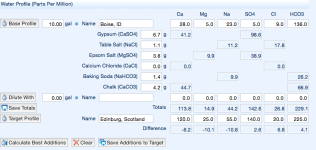Johnh3nry
Apprentice
I've been brewing for a long time, but I'm still trying to get my head around water adjustments. Tomorrow I'm planning to brew a 5 gallon batch of my favourite pale ale recipe which includes:
Grain Bill
10 lbs Maris Otter
2.5 lbs Light Munich
1 lb Crystal 60
Here are my hop additions
60 min - 1 oz challenger
30 min - 1 oz Cascade
15 min - 1 oz Cascade
5 min - 1 oz Cascade
Yeast is Wyeast 1272 American Ale II with a nice 1/2 litre starter currently on the stir-plate.
I'm fairly happy with the results of previous batches using this recipe but I would like to see if I could improve it by making some water adjustments. Unfortunately I don't know what I'm doing in spite of doing research and running numbers through various spreadsheets.
I agree with comments in other posts that just throwing some 5.2 stabilizer in my batch is not necessarily the right approach. I've taken my existing water profile and run it through the Brun Water spreadsheet. I see the results but it is still not clear to me what to do. It isn't that I don't understand the spreadsheet itself. I can see the numbers change when I update various quantities. I still maintain that in spite of this, I don't know what I'm doing or why.
If you don't mind, I would like some opinions on how to proceed given the recipe above and the water profile below. My goal is to have a dry beer with lots of nice hop flavour. Less Malt and More Hop . I use the BIAB technique and typically mash with 7.5 gallons of water for a 60 minute boil. If I should mash with different water than the rest of the boil, I would really like to hear that.
. I use the BIAB technique and typically mash with 7.5 gallons of water for a 60 minute boil. If I should mash with different water than the rest of the boil, I would really like to hear that.
What kind of water adjustments would you make?
Existing Water
Calcium (Ca): 35
Magnesium (Mg): 9
Sodium (Na): 15
Bicarbonate (HCO3): 104.4
Sulfate (SO4): 30
Chloride (CI): 28
pH: 7.7
Alkalinity: 86
Thanks in advance,
John
Grain Bill
10 lbs Maris Otter
2.5 lbs Light Munich
1 lb Crystal 60
Here are my hop additions
60 min - 1 oz challenger
30 min - 1 oz Cascade
15 min - 1 oz Cascade
5 min - 1 oz Cascade
Yeast is Wyeast 1272 American Ale II with a nice 1/2 litre starter currently on the stir-plate.
I'm fairly happy with the results of previous batches using this recipe but I would like to see if I could improve it by making some water adjustments. Unfortunately I don't know what I'm doing in spite of doing research and running numbers through various spreadsheets.
I agree with comments in other posts that just throwing some 5.2 stabilizer in my batch is not necessarily the right approach. I've taken my existing water profile and run it through the Brun Water spreadsheet. I see the results but it is still not clear to me what to do. It isn't that I don't understand the spreadsheet itself. I can see the numbers change when I update various quantities. I still maintain that in spite of this, I don't know what I'm doing or why.
If you don't mind, I would like some opinions on how to proceed given the recipe above and the water profile below. My goal is to have a dry beer with lots of nice hop flavour. Less Malt and More Hop
What kind of water adjustments would you make?
Existing Water
Calcium (Ca): 35
Magnesium (Mg): 9
Sodium (Na): 15
Bicarbonate (HCO3): 104.4
Sulfate (SO4): 30
Chloride (CI): 28
pH: 7.7
Alkalinity: 86
Thanks in advance,
John


